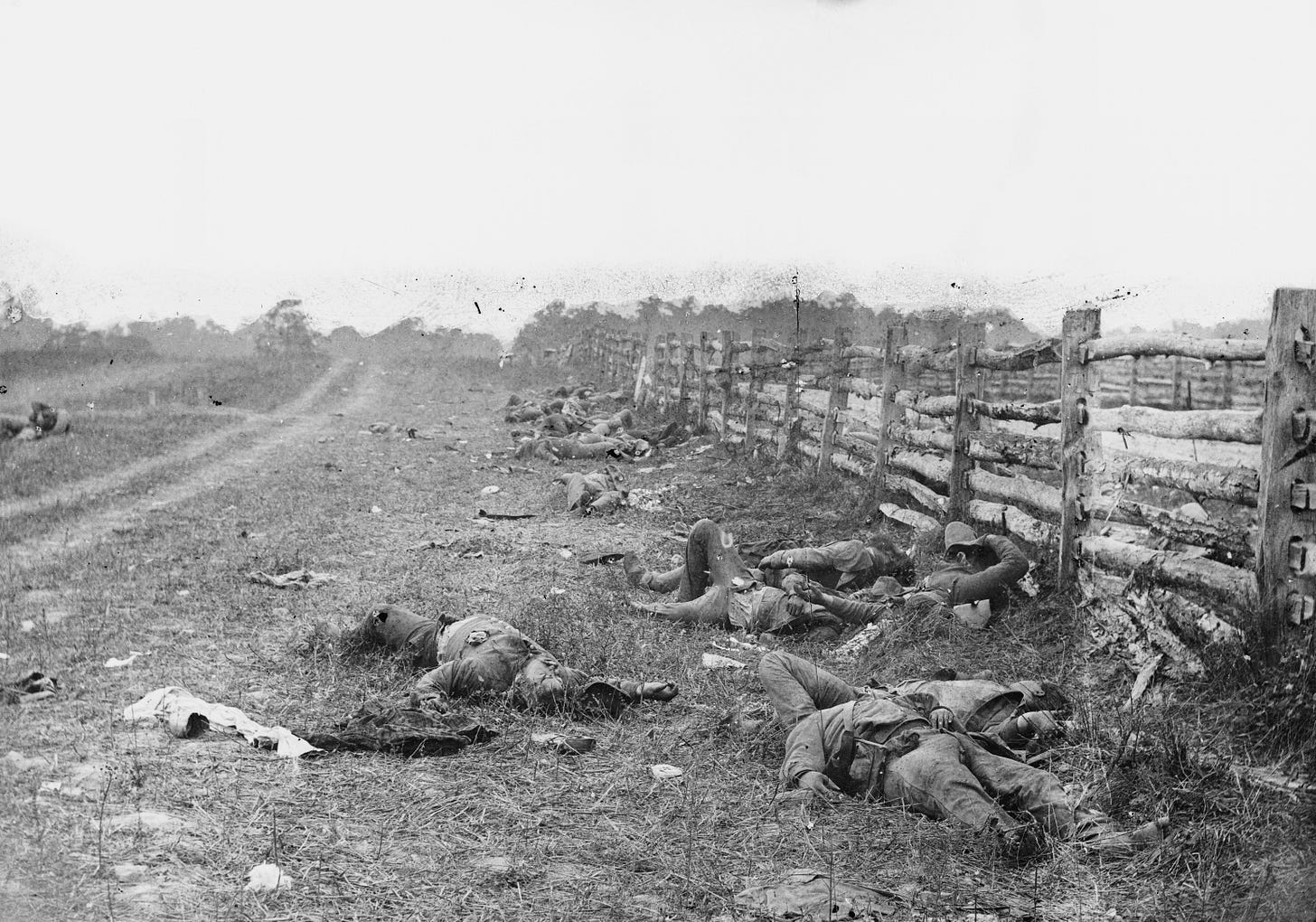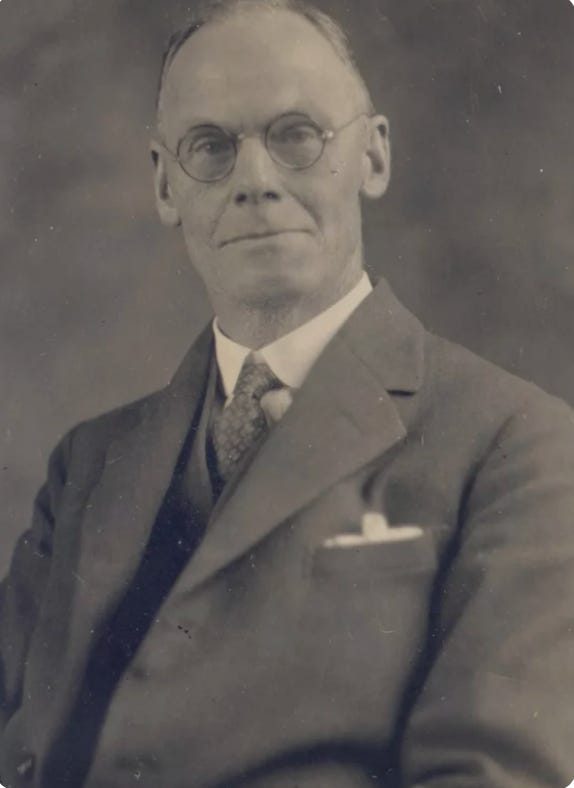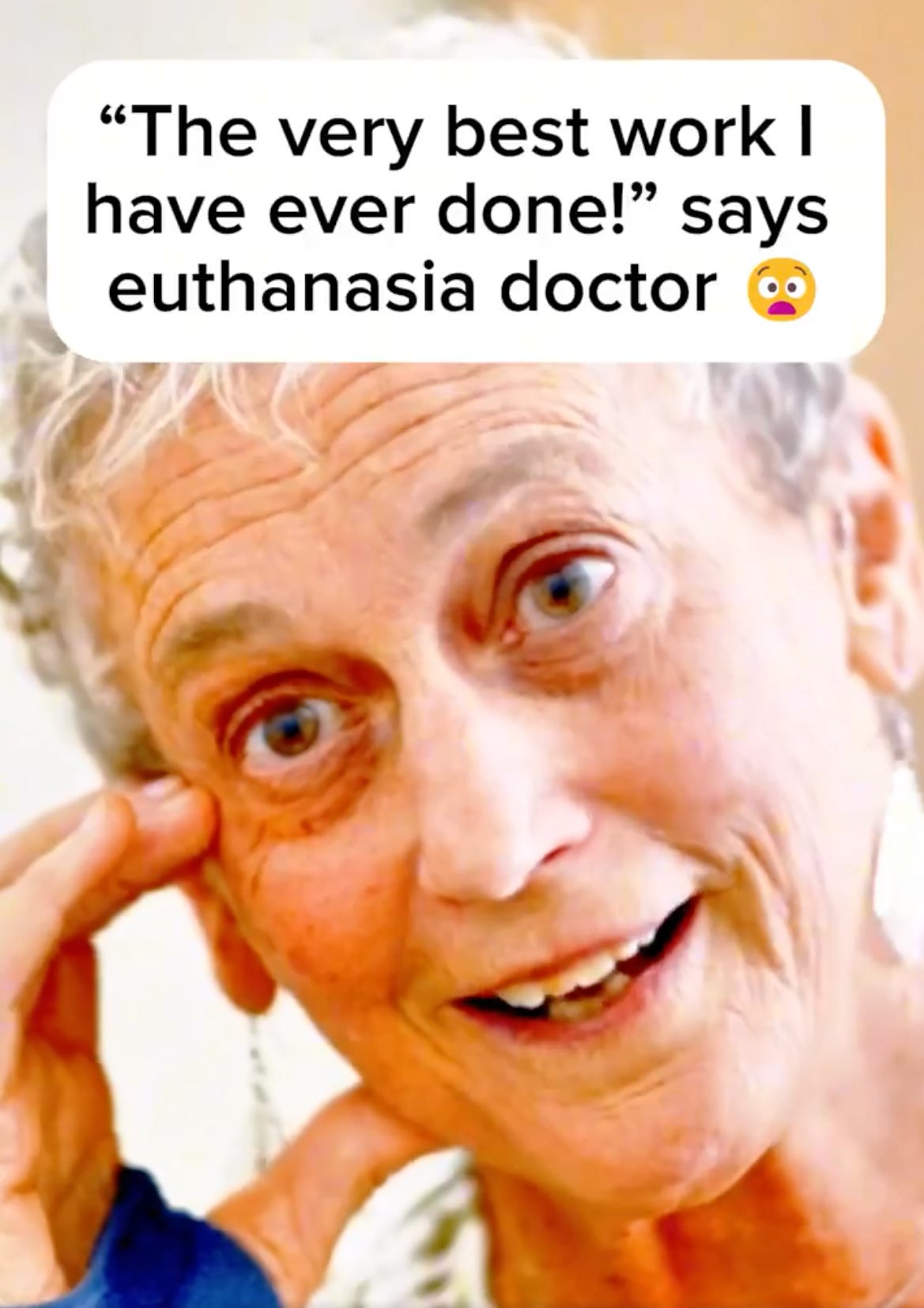UK About to Pass a State Sanctioned Murder Bill
All safeguards blown out of the water as Doctors will be forced to kill their patients including children.
The UK Parliament is about to vote on legalising ‘Assisted Dying’. The proposed ‘The Terminally Ill Adults (End of Life) Bill’ is being pushed by Labour MP Kim Leadbeater. The parliamentary process has been much criticised as the committee which has been raised to scrutinise the bill is wholly made up of individuals on the side of ‘assisted dying’. Unsurprisingly they have voted down most of the safeguarding amendments put forth by palliative care doctors, downs syndrome charities, anorexia charities and elderly care charities. They have also sought to change the founding principles of the National Health Service document as written in 1946. Lastly, they have voted to allow unscrupulous unregulated private euthanasia companies to wade in and have voted against them being liable. They have not heeded any of the warnings put forth by countries such as Canada and the Netherlands who implemented ‘death on demand’ some time ago. That children may also fall foul of this act if deemed ‘sufficiently mature’ should also bring great concern. Make no bones about it, this is a state sanctioned Murder Bill. I have written about this before here.
There is no ‘safe’ assisted dying. Dying in and of itself is not a “safe” action. Irreversible, yes. Final, absolutely. But putting safe and ‘assisted dying’ together is a non-sequitur, it makes no sense. Previously the term ‘mercy killing’ was used. This was (perhaps) more honest. That a person was to kill someone ‘out of mercy’ made no bones that killing first and foremost what was being done. Its motives… mercy. I think of war films wherein soldiers are miles from medical aid and come upon a solider bleeding out in agony. Killing in this instance may be interpreted as mercy. But killing nonetheless.

Over time mercy killing, was rebranded ‘euthanasia’ and now sits politically as ‘assisted dying’. It’s no longer on a battlefield but projected as a carefully curated space with sofas and soft lighting. It’s purveyors present it as something no different from assisting someone frail up a stair, or opening a door. Not the reality. Not at all.
Or buy my a cup of coffee!
https://buymeacoffee.com/kateedeeming2
Firstly killing someone by an ‘assisted dying’ regiment can be brutal. It is worth noting that
“no assisted dying drug regime has been approved by any drugs regulatory anywhere in the world. None of the combinations of legal drugs used have been scientifically evaluated for ending life. Drug mixtures for euthanasia are similar to the cocktails injected in judicial executions comprising a short acting anaesthetic agent (e.g. propofol) often with rocuronium which causes total paralysis, leading to death by asphyxia. Evidence from judicial executions suggests some prisoners may have regained awareness while paralysed.
Assisted suicide is not straightforward. Oregon reports over 24 years show a 6.4% complication rate, and prolonged dying: half of patients took between 30 minutes and 104 hours to die. Nine patients re-awakened.”

Asking For It
The language of the pro-assisted dying lobby and legislators obfuscates all the difficulty and extended suffering that their movement may incur, instead employing the trademark phrases we have come to expect from our electorate: ‘Choice’ and ‘Rights’ with a side dose of consent.
But is life really that simple? In this increasingly mechanistic approach to our existence, we are trained into ‘the great dissociation’ - bodies are merely ‘parts’ to be traded (trans ideology) and life is merely a switch one turns on (surrogacy)… or off (assisted dying & abortion). In the interim one is merely a hedonistic robot in search of the pleasure principle. Body parts can be swapped at will (breasts, genitals) , sex is driven by individual desire (sex work is work, the body merely a receptacle one can utilise for a buck) and the consent principle rules us all.
But here's the trick - pay attention to WHOM is being sterilised and killed. We rightfully found the Nazi’s term ‘useless eaters’ abhorrent. In Nazi Germany the disabled and those unable to work to contribute to the economy were exterminated -seen to be useless as non contributors to the economy.

Fast forward 2025 who is most at risk most likely to seek this ‘procedure’? Cleverly (for the eugenicists) there has been a bait and switch as now the disabled, the poor, the depressed, the elderly, the anorexic…. will ask to be killed as a matter of their ‘human rights’.
There is an undoubted eugenics edge to ALL of this. We must not forget that the roots of ‘assisted dying’ are firmly in the eugenics movement of the early 20th century. In fact, one of the lead lobby groups for this particular bill ‘Dignity and Choice in Dying’ founder Charles Killick Millard was a British doctor who openly supported eugenics.
The followers of this belief are incapable of seeing the value of individuals unless they are 'contributing’ to the machine of life. Wherein eugenics may have been a fringe movement in the past, now it’s been mainstreamed because as the broken, the frail, the vulnerable are *asking* for it.
But what of the doctors?
One of the most worrisome aspects of this new proposed bill is that the founding document of the NHS (National Health Service) is to be changed.
Kim Leadbeater has tabled the amendment to the foundation NHS legislation preserved since 1946: “The Government’s Duty to improve the physical and mental health of the people of England and Wales, and prevent diagnose and treat physical and mental illness.” Now NHS doctors will be compelled to initiate state sanctioned murder.
What’s more they have already indicated that they will allow a completely unregulated free market in the NHS murder trade with complete exemption from civil liability and no duty to comply with codes of practice. Assisted Dying plans to outsource provision to private companies.
Nikki da Costa lays out the failings here: “Under this bill they’d be exempt from any civil liability (clause 25), deaths would be exempt from investigation by a coroner (clause 29), there’ll be a code of practice but it’s only something you have to “have regard to” and failure to follow the code is “not itself” a problem, and the only monitoring will be by a Commissioner (the independent scrutiny by the CMO is to be removed). There is no regulator, no licensing requirement, no duties private providers would have to comply with.”
Profit motives are no secret. Compelled killing is big business, with organisations and quangos all over the globe racketeering on behalf of the ‘human right’ to die. The global Human Euthanasia Services market is valued at approximately $31.3 billion in 2024 with a projected value of $58.08 billion by 2031.
How could they possibly predict that unless they already knew laws were going to change?
Doctors Walk Out Crisis
Some doctors have already indicated they will leave the profession is forced to comply with the legislation. What will this spell for our already struggling NHS? Who will be left behind…. zealots? Like this lady…
“This is the best work I have ever done” states Dr. Ellen Wiebe who has euthanised hundreds of patients as part of the Canadian MAID program (Medical Assistance in Dying). Featured in the BBC Documentary Better off Dead? Dr. Wiebe gleefully sings the praises of watching people die. It’s otherworldly. And when I say otherworldly I mean- not the world I want. She appears utterly unhinged.
MAID’s failings are often cited in the case made against Assisted Dying. In Canada MAID is now the 5th leading cause of death with one of the fastest growing euthanasia programs in the world. Canada has expanded the original remit of its MAID program to include individuals experiencing ‘depression or suicidal thoughts’. Canadian news outlets have reported on cases where people with disabilities have considered assisted dying due to lack of housing or finances.
Palliative Care
One of the main criticisms of the legislation is that assisted dying provision will be extended whilst palliative care services are being diminished. It has been suggested that existing NHS palliative care centres will be forced to provide assisted dying ‘services’ going against their core principles.
reports: “In January Sarah Cox, president of the Association for Palliative Medicine told the committee the bill could cause serious problems. More than 2 in 5 APM members have stated in a survey they would leave if this bill was passed. The response from the committee was shockingly hostile. The Leadbeater team argued that giving institutions an opt out was unnecessary, or harmful. Concerns about the effect on the end-of-life care workforce were brushed aside. Despite the fact that other countries have instituted institutional opt-out, the committee overwhelming voted against it. What’s more Kit Malthouse, Tory MP and Kim Leadbeater’s most forceful ally on committee appeared to say - twice - that hospices which opted out should be defunded or made to comply.”Here is an excellent mini-documentary on the experience of good palliative care.
Who else is left behind?
And what of the vulnerable who might be ‘convinced’ that their lives are no longer worth living? I worked with an adult special needs dance group for 8 years. It is blatantly obvious to me how vulnerable this cohort of individuals is. How easily they could be convinced that ‘dying was better’.
In fact Down's Syndrome campaigners were threatened with a gag order who ‘sought to misrepresent’ what was being debated at the committee. In the meantime amendments to further safeguard people with learning disabilities, autism and anorexia were tabled and dispatched. More than 100 amendments put forth to improve safeguards for some of the most vulnerable groups in our society were, on the main, rejected. That the notion of a vulnerable person being coerced into ‘choosing’ death was not fully explored. That someone might ‘choose’ to be killed as a matter of not feeling a burden to their family or the state for example. We see this in Canada. That financial incentives could ‘encourage’ a doctor to push a patients life to be terminated, voted down. Nikki da Costa outlines many concerns that were not scrutinised in the thread here.
Death Panels
Kim Leadbeater and her committee have proposed that in order for a person to qualify for assisted suicide they would be assessed by a lawyer, a social worker, and a psychiatrist to guard against any misuse. What is not required, however, is that the panel members ask any questions of the patient. Professor Katherine Gleeman and a further 34 doctors, psychiatrists, social workers and geriatricians write in their letter to the Observer: “They don’t mention the glaring limitation of this proposal, which is that there is no requirement for the panel members to ask questions of the patient. Without this, there can be no meaningful assessment, for example of capacity or coercion’. What’s more the panel used to assess the person seeking death will not know the person, not even have to see them in real time in order to sanction their death. These panels will be self selecting therefore most likely be pro-assisted suicide. This is dangerous.
Organ Donation?
One of the associated ethical considerations that may develop as a result of this bill passing is organ donation after assisted dying. One study included a woman in her 30s with anorexia and depression who was euthanised in the Netherlands. Before her death, she said she was ‘happy to improve another’s life by donating her organs”. Will the financial incentives, the push to ‘do the right thing’ push vulnerable and frail members to end their lives? How far could this go?
To be clear (if you haven’t guessed) I am opposed to the state involving itself in the killing of its citizens. However the extremes of this current iteration should chill the most strident supporters of ‘euthanasia’. I know there are people mired in grief for the suffering of their loved ones who are being weaponised by this bill. I can only imagine that in the instance of your personal story the availability of ‘euthanasia’ does *seem* merciful. It is these individual stories that seed people’s minds on the periphery. But as the bandwidth of allowability extends who and why people are killed will also expand. I don’t think that’s a world we want.
Some thoughts on death
In writing this piece I got to thinking about the history of death and Pauper Funerals. From the 1850-1860s the UK needed to address the growing problem of poor people dying the workhouses. In 1834 the Poor Law Amendment Act had been passed (The New Poor Law). The basis of this amendment was based on Thomas Malthus’s principle that population increased faster than resources unless checked. (sound familiar?). When this act was passed all poor relief was channeled through workhouses (poorhouses in Scotland).
The new system would be deliberately harsh with minimum comfort. For example, chairs were to be made without backs to make sitting uncomfortable. People were given a basic diet and men and women were strictly separated. As well as this, husbands and wives would live apart, as would parents and children.
The idea was to punish the 'work-shy' so that only the truly destitute or incapable would ask for help. (from Historic England)
The direness of the accommodation did serve to create a stigma for those who were left to depend on the workhouses. The most vulnerable- the disabled, the mentally ill, the poor, the abandoned - often through bad luck and accident of birth- left with no other option forced to suffer another mortification. Death and pauper funerals by association were another reflection of their ‘failure’ in society.

Which brings me to the question, who dies ‘well’, historically speaking?
Death is, by its nature, at the same time profoundly individual (one dies alone) and social - it is the fate of all as well as a diminution of the community of survivors. Thomas Laqueur
Is it possible in our exposition of the matters surrounding Assisted Dying that we are merely regurgitating the self same problem that has plagued humanity for hundreds of years if not more? Pauper Funerals came about as a response to the poor being unable to pay for their death due to a breakdown (sometimes deliberate) of social systems. The Pauper Funerals existence in and of itself was seen by many as a great ignominy. Poor often preferred to ‘go without’ in terms of what they needed to live (ie. food) to save the little money they had so as to avoid having to rely on the service. To the early 19th century person, the Pauper Funerals represented a failure to have bonds within a community with fellow humans. So to we see with assisted dying people feeling that their lives have no worth, no connection to the living to justify their own lives continuance.
A respectable funeral was, it appears, the last of the old communal rights to go... The poor went from objects of charity to being objects of administration. Thomas Laqueur
What’s more the market of bodies as a commodifiable asset is eerily familiar as noted in the organ donation possibility above. In the times of Pauper Funerals ‘resurrection’ men would rob graveyards in order to supply cadavers to anatomists. It is estimated that almost 4000 people would die in London’t workhouses alone each year, providing more than adequate supply of bodies in the burgeoning trade. Keeping in mind those who ended up in Pauper Funerals relegated claims to their own bodies, therefore being worth more in death then life.
I am reminded of the passing of my Grandfather ‘Big Jim’. In the final years of his life as he became less capable my Mother and her sisters gathered around him to provide a quality of life deserving of his many years of service as Father, Grandfather and good man to us all. In his last days the bed was brought into the dining room of my Auntie’s house with chairs and sofas gathered round. Over those days there was a steady stream of visitors old and young as we sat, laughed, told stories, held hands and hugged. My son was just 3 months old, he also sat in the bed with my Pop looking with interest at the tubes and his great-grandfather, whose eyes smiled at the sight. When he passed naturally his three girls were there holding him.
Somehow that seems just right.
Big Thanks to the following individuals who have been following the scrutiny of this bill forensically from which I have been able to illicit much material for this substack:
Dan Hitchens Senior Editor First Things Magazine, Columnist Compact Magazine Dennis Noel Kavanagh LawyerAnthony Horan, Lawyer and Director of the Scottish Catholic Parliamentary Office
Dr. Anthony Hinton Retired Consultant Surgeon, Member Hart Group.
Dr. Calum Miller Ethicist an Philosopher. Medical Doctor.
Nikki Da Costa Ex Director of Legislative Affairs No10.
Thanks for reading and thanks to current subscribers! Subscriptions allow me to continue to spend time reporting on what is happening here in Scotland and how it connects to bigger issues. My writing and podcast work is alongside my advocacy in working directly with parents. As this is entirely reader-supported, with no paywalls your support is what keeps things going. If you enjoyed this post, and would like to see more, please consider…
Subscribing monthly at Substack (or giving a gift subscription!)
Making a one-off contribution via BuyMeACoffee
Contributing via bank transfer to Tide Bank (Clearbank), account
Sort Code 04 06 05, Account Number 0000 8583 (account MS KE DEEMING, use your email as a reference if you would like acknowledgement
Your support is what allows me to continue for which I am hugely thankful.
Assisted Suicide (Eugenics Mark 4)
Eugenics is the belief that humans can be ‘improved’ through ‘selective breeding’. This popularisation of this philosophy ramped up in the UK in the late 19th century and (perhaps) reached its nadir in the public eye with Hitler’s program of the ‘final solution’ and the Nazi concentration camps. Behind closed doors however other programs of ‘selective…
Trans Army
In the ongoing maze of contradictions, controversy and court cases around the thing we’ve named ‘gender ideology’ I cannot help but think of bigger picture problems. We have a host of powerful men appropriating female space using the ‘get out of jail free card’ (literally) of self id (















We never learn from history. I actually agree with “Legal, safe, rare” abortion (mostly for life-saving medical reasons), but that’s not the situation we’ve ended up with, abortion on an industrial scale. The same thing is happening with euthanasia.
Going back to the ancient Greeks, euthanasia was allowed and doctors often killed patients instead of curing them, until Hippocrates introduced the Hippocratic Oath which states that doctors should “do no harm.” It’s hard to think of a better slogan for medical professionals than that. But we think we’re so clever now and know so much better than the ancients.
The Romans were shocked that Jews and Christians didn’t practice abortion and euthanasia or leave disabled newborns to die of exposure, but raised them with as much love as their healthy children. We seem to be returning to that kind of paganism.
Workhouses are interesting, as originally they were supposed to provide comfortable accommodation for the “deserving” poor, but in the end all poor people were stigmatised as lazy and made to dwell in terrible conditions, which also saved money for local government. Another bad precedent.
I have been suicidally depressed and despairing in the past and I’ve had psychiatrists and therapists give up on me. If I’d had recourse to easy-access suicide centres, goodness knows what I might have done. Aside from devastating my family, I would never have met my wife, gone to my sister’s wedding or seen my nephew. I would not have had the most profound religious experience of my life or grown into the person I am now. All of this means nothing to the “death with dignity” brigade.
By the way, eugenics WAS a mass movement until World War II, including on the left. People like H. G. Wells, George Bernard Shaw, Marie Stopes and Margaret Sanger were interested in it – to support the good of mankind by eliminating the “inferior.” After Nazism, eugenics became a “contaminated brand” on the left, but it’s back again.
Thanks for this article, Kate. Will we see a broad political movement in the UK which resists the pro-death lobby on all fronts? In the USA, the group Feminists Choosing Life of New York is advocating for a 'consistent life ethic', but it's so far removed from mainstream politics and media it might as well be invisible. Why is it being left to a handful of us to resist this cultural revolution?